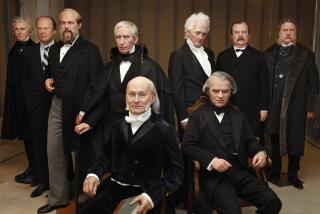To Have Great Leaders, Citizens Must Foster Great Leadership
- Share via
It seems ironic that members of Congress who plead for citizens to take responsibility for their own lives find it necessary to amend the Constitution to force themselves to do what it says they should do--take care of the nation’s fiscal matters. It seems strange that some members of Congress want term limits, implying citizens aren’t capable of making choices about who their elected representatives should be. It seems puzzling that, in the name of cost cutting, some corporate CEOs approve massive layoffs at the same time that they enjoy expensive perks and increase their own salaries and bonuses. And it seems surprising that executives who proclaim they value diversity have boards of directors and corporate officers who look and think just as they do.
Why is there so much anxiety about the performance of business and government? Why is there so little trust in those who head up our institutions? If asked to name today’s great leaders, most Americans would find it difficult. Why is this so? What constitutes great leadership?
John Gardner, chairman of the National Civic League and former president of the Carnegie Foundation, said in a 1968 address at Caltech that “a free society does not need leaders to tell it what to do.” Instead, he suggested, it needs leaders to symbolize its values, clarify its choices, help sift priorities and--most of all--keep hope alive. This may explain why we seem to lack great leaders today. America’s values seem in conflict; our choices don’t seem clear; our priorities have not been sifted. And there is more fear than hope.
Machiavelli, the 15th-Century political philosopher, believed that the presence of fear is often associated with leadership. But during the 1930s, President Franklin D. Roosevelt told Americans the only thing they had to fear was fear itself. Like today’s, those were turbulent times. Roosevelt’s admonition helped turn fear into hope--and, coupled with concrete action, kept hope alive. What’s missing today in business and government is a similar type of leadership. We have leaders, but not great leaders. Instead of a sense of purpose, Americans experience name-calling, scapegoating, a distaste for diversity and an intolerance for debate and contemplation.
We expect those in positions of power to articulate and implement organizational visions in times of rapid change and uncertainty. We don’t expect leaders to impose a set of values with threats of retribution for those who choose to question. We recoil at attempts to oversimplify complexity in order to make it easier for followers to follow. We subconsciously worry about those who act swiftly when thoughtful deliberation seems more prudent. And we wonder why it is necessary to create enemies in order for leaders to be perceived as effective. Looking at business and government today, these sentiments explain why Americans seem anxious and fearful.
Unfortunately, whereas Roosevelt was able to turn fear into hope, today’s “leaders” seem to be turning hope into fear. Perhaps that is why naming great leaders seems so challenging. We are forced to admit that we confuse symbolic behavior with leadership. We allow others to think on our behalf. We follow radio and TV talk show hosts whose main expertise lies in inflaming emotions.
*
So the question remains: Why are there so few great leaders today?
Part of the answer can be found in something else John Gardner told that 1968 audience. He noted that the U.S. Constitution reads, “We the people of the United States . . . ,” not “We the elected officials,” not “We the business executives,” not “We the religious and academic leaders”--just “We the people.” Is it possible that what is missing in America today is a willingness on the part of citizens to become informed and participate in the development of a common purpose, and that too few in positions of power see their role as guiding the achievement of that goal?
Americans are an impatient people used to fast food, speedy communication and quick service. They also want instant leaders. However, great leaders--whether in business or government--are not available upon request. What is needed are men and women who encourage thoughtful reflection about how to make our institutions more effective and at the same time proclaim a common purpose and shared values. Oh, that this need could be met in 100 days!
More to Read
Inside the business of entertainment
The Wide Shot brings you news, analysis and insights on everything from streaming wars to production — and what it all means for the future.
You may occasionally receive promotional content from the Los Angeles Times.










